最新英语特殊句式总结
英语的特殊句式

英语的特殊句式英语中有一些特殊的句式结构,以下是几个常见的特殊句型:强调句型 (Emphatic Structure)通常采用"It is/was + 强调部分 + that/who + 其他部分"的结构。
示例:It was in China that Tom first met Mr. Lin.It's not what he said but the way he said it that matters.否定词“not”与“until”的强调用法当用于时间状语从句时,"not until"位于句首构成倒装结构以强调时间点。
正常句:He didn't go back home until midnight.强调句:It was not until midnight that he went back home.疑问形式的强调句特殊疑问词(如what, when, where等)+ be动词 + it + that + 其他部分示例变问句:Where was it that you got to know her?省略形式在口语或非正式书面语中,强调句中的"that"有时可以被省略,但不影响理解其为强调句。
如:They couldn't say what it was that troubled them.定语从句的强调强调定语从句的内容时,也可以使用强调句型。
示例:It's not who is right but what is right that is of importance.被动语态强调被动语态中也可用来强调动作的承受者。
示例:It is this book that is widely read by students.比较级句型的强调使用 "no...more than", "not so much...as" 等结构来强调比较对象的相对性。
特殊句式知识点详解(初中英语专项复习)4
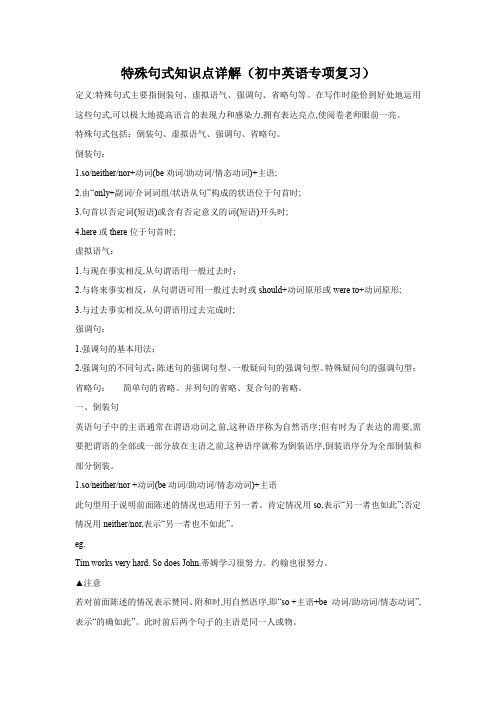
特殊句式知识点详解(初中英语专项复习)定义:特殊句式主要指倒装句、虚拟语气、强调句、省略句等。
在写作时能恰到好处地运用这些句式,可以极大地提高语言的表现力和感染力,拥有表达亮点,使阅卷老师眼前一亮。
特殊句式包括:倒装句、虚拟语气、强调句、省略句。
倒装句:1.so/neither/nor+动词(be劝词/助动词/情态动词)+主语;2.由“only+副词/介词词组/状语从句”构成的状语位于句首时;3.句首以否定词(短语)或含有否定意义的词(短语)开头时;4.here或there位于句首时;虚拟语气:1.与现在事实相反,从句谓语用一般过去时;2.与将来事实相反,从句谓语可用一般过去时或should+动词原形或were to+动词原形;3.与过去事实相反,从句谓语用过去完成时;强调句:1.强调句的基本用法;2.强调句的不同句式:陈述句的强调句型、一般疑问句的强调句型、特殊疑问句的强调句型;省略句:简单句的省略、并列句的省略、复合句的省略。
一、倒装句英语句子中的主语通常在谓语动词之前,这种语序称为自然语序;但有时为了表达的需要,需要把谓语的全部或一部分放在主语之前,这种语序就称为倒装语序,倒装语序分为全部倒装和部分倒装。
1.so/neither/nor +动词(be动词/助动词/情态动词)+主语此句型用于说明前面陈述的情况也适用于另一者。
肯定情况用so,表示“另一者也如此”;否定情况用neither/nor,表示“另一者也不如此”。
eg.Tim works very hard. So does John.蒂姆学习很努力。
约翰也很努力。
▲注意若对前面陈述的情况表示赞同、附和时,用自然语序,即“so +主语+be 动词/助动词/情态动词”,表示“的确如此”。
此时前后两个句子的主语是同一人或物。
eg .-She likes Chinese very much.他非常喜欢汉语。
-So she does.的确如此。
高中英语2024届高考特殊句式汇总(共45句)

高中英语特殊句式1.It (all) depends: 视情况而定2.It’s up to sb (to do sth):由某人决定(做某事)——Shall we go to the art exhibition?——It’s up to you.3.It’s time to do sth/ for sth/ for sb to do sthIt's time that +从句(用过去式或者should+v)4.It is no use/ good/ point/ sense (in) doing sth.做某事没有用处/益处/意义/意思It is no point arguing with him about it.和他争论这事没有意义。
5.It will be long before... 还要很久才......It was + 段时间 +before...过了多久才......It will be long before we meet each other again.还要过很久我们才能再次见面。
It was two years before he came back from abroad.过了两年后他才回国。
6.It won’t be long before...没过多久就.....It won’t be long before you realize the importance of learning English well.7.It is/ has been+一段时间+since从句(过去时)自从……以来有多久了It is years since I enjoyed myself so much.我有好多年都没有玩得这么开心了。
8.It is/ was+被强调成分+that:强调句型It was at midnight that I got back home yesterday.昨天午夜我回到了家里。
最新中考英语_【2021全国中考二轮复习】单选之特殊句式(解析版)

专题09 单项选择之特殊句式【要点提炼】考点扫描一、感叹句:What +(a/an)+ adj. + 名词+ 主语+ 谓语!How + adj./adv. + 主语+ 谓语!二、倒装句① So does / is he与So he does / is:上文提到某人做了某事或处于某种状态(肯定句),这时要表达另一个人也这样,要用So does/is he;若只是表达对第一句内容的强调,则要用so he does/is,so=indeed,表示"确实,的确"。
① Neither / Nor does/is he与Neither / Nor he does / is:上文提到某人没有做某事或处于某种状态(否定句),这时要表达另一个人也没有,要用Neither / Nor does/is he;若只是表达对第一句内容的强调,则要用Neither / Nor he does / is。
倒装句虽然不是每年必考,但也常有涉及,考生在备考时主要注意以上这两种的用法即可。
三、祈使句祈使句没有主语,常表达说话人对对方的劝告、叮嘱、请求或命令等。
① 肯定形式:a. 行为动词原形+其他成分;b. Be动词+其他成分(形容词、名词或介词短语等);c. Let+宾语+动词原形+其他成分。
① 否定形式:a. Don’t+行为动词原形+其他成分;b. Don’t be+其他成分(形容词、名词或介词短语等);c. Let开头的祈使句,可在Let前加Don’t,也可在Let后宾格的名词或代词后面加not;Let’s开头的祈使句,必须在Let’s后加not。
要注意祈使句的肯定及否定形式,尤其要注意Let开头的祈使句的否定表达。
解题技巧感叹句记忆口诀感叹句,并不难,what与how应在前。
形容词、副词跟着how,what后面名词连。
名词若是可数单,前带冠词a或an。
主语、谓语放后面,省略它们也常见。
祈使句记忆顺口溜祈使句,祈使句,请求、命令或建议。
英语六大特殊句式
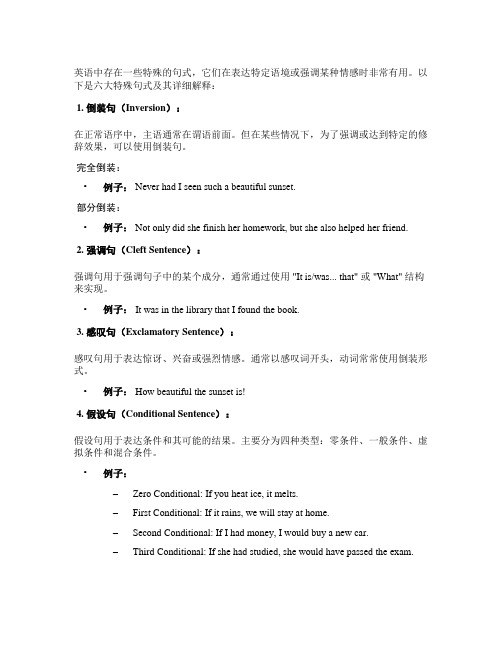
英语中存在一些特殊的句式,它们在表达特定语境或强调某种情感时非常有用。
以下是六大特殊句式及其详细解释:1. 倒装句(Inversion):在正常语序中,主语通常在谓语前面。
但在某些情况下,为了强调或达到特定的修辞效果,可以使用倒装句。
完全倒装:•例子: Never had I seen such a beautiful sunset.部分倒装:•例子: Not only did she finish her homework, but she also helped her friend.2. 强调句(Cleft Sentence):强调句用于强调句子中的某个成分,通常通过使用 "It is/was... that" 或 "What" 结构来实现。
•例子: It was in the library that I found the book.3. 感叹句(Exclamatory Sentence):感叹句用于表达惊讶、兴奋或强烈情感。
通常以感叹词开头,动词常常使用倒装形式。
•例子: How beautiful the sunset is!4. 假设句(Conditional Sentence):假设句用于表达条件和其可能的结果。
主要分为四种类型:零条件、一般条件、虚拟条件和混合条件。
•例子:–Zero Conditional: If you heat ice, it melts.–First Conditional: If it rains, we will stay at home.–Second Conditional: If I had money, I would buy a new car.–Third Conditional: If she had studied, she would have passed the exam.5. 比较句(Comparative Sentence):比较句用于比较两个或更多事物之间的差异。
英语特殊句式知识点总结

英语特殊句式知识点总结1. Conditional SentencesConditional sentences are used to express a hypothetical situation and its potential outcome. There are four main types of conditional sentences in English, each with its own structure and usage.Zero Conditional: Used to express general truths or facts.Structure: If + present simple, present simpleExample: If you heat ice, it melts.First Conditional: Used to talk about possible future events and their likely outcomes. Structure: If + present simple, will + base formExample: If it rains, I will take an umbrella.Second Conditional: Used to talk about hypothetical or unlikely situations and their potential outcomes.Structure: If + past simple, would + base formExample: If I won the lottery, I would travel the world.Third Conditional: Used to talk about imaginary situations and their unrealized outcomes in the past.Structure: If + past perfect, would have + past participleExample: If she had studied harder, she would have passed the exam.2. Relative ClausesRelative clauses are used to provide additional information about a noun in a sentence. They are introduced by relative pronouns such as "who," "whom," "whose," "which," and "that." Relative clauses can be restrictive (essential to the understanding of the sentence) or non-restrictive (providing additional, non-essential information).Restrictive Relative Clause: Provides essential information about the noun and cannot be omitted without changing the meaning of the sentence.Example: The book that is on the table is mine.Non-Restrictive Relative Clause: Provides additional, non-essential information about the noun and is set off by commas.Example: My sister, who lives in New York, is a lawyer.3. Passive VoiceThe passive voice is used to emphasize the action performed on the subject rather than the subject performing the action. It is formed with the auxiliary verb "to be" followed by the past participle of the main verb.Structure: Subject + to be + past participle (by + agent)Example: The cake was baked by my mom.4. InversionInversion is a special sentence structure in which the usual order of subject and verb is reversed to emphasize an element in the sentence or to add variety to the writing. Subject-Verb Inversion: Used to emphasize the subject or to create a more formal tone. Example: Never have I seen such a beautiful sunset.Conditional Inversion: Used to create a more formal or poetic tone in conditional sentences. Example: Were I rich, I would buy a house by the beach.5. Cleft SentencesCleft sentences are used to emphasize a particular part of the sentence by placing it in a separate clause.It-cleft: Used to emphasize a particular element in the sentence.Structure: It + to be + emphasis + that/who/which + rest of the sentenceExample: It was the pizza that I enjoyed the most.Wh-cleft: Used to emphasize a particular element in the sentence using a wh-word. Structure: Wh-word + to be + emphasis + that/who/which + rest of the sentence Example: What she needs is a little encouragement.6. Emphatic StructureEmphatic structures are used to emphasize particular elements in the sentence by using auxiliary verbs or do-support.Do-Support Emphasis: Used to emphasize the main verb in the sentence.Example: I do love ice cream.Auxiliary Verb Emphasis: Used to emphasize the main verb by adding an auxiliary verb.Example: I can swim.7. Exclamatory SentencesExclamatory sentences are used to express strong emotions or feelings. They are characterized by the use of an exclamation mark and often begin with "What" or "How." What-a/How-a Clauses: Used to express surprise or admiration.Example: What a beautiful flower!How-adj Clauses: Used to express strong emotions.Example: How delicious the food is!In conclusion, understanding and using special sentence structures in English can enhance communication and add depth to the language. From conditional sentences to relative clauses, the passive voice, inversion, cleft sentences, emphatic structures, and exclamatory sentences, these special structures allow speakers and writers to convey meaning in a more nuanced and engaging manner. By mastering these structures, one can effectively express complex ideas and emotions while adding variety and depth to their language use.。
高中英语语法:特殊句式
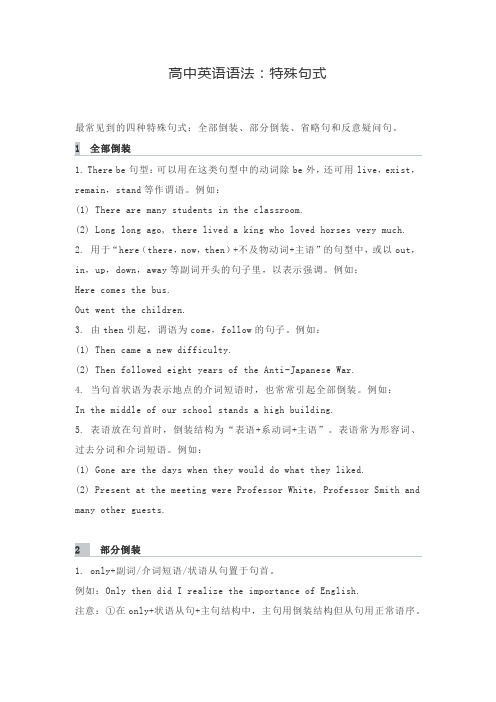
高中英语语法:特殊句式最常见到的四种特殊句式:全部倒装、部分倒装、省略句和反意疑问句。
1 全部倒装1. There be句型:可以用在这类句型中的动词除be外,还可用live,exist,remain,stand等作谓语。
例如:(1) There are many students in the classroom.(2) Long long ago, there lived a king who loved horses very much.2. 用于“here(there,now,then)+不及物动词+主语”的句型中,或以out,in,up,down,away等副词开头的句子里,以表示强调。
例如:Here comes the bus.Out went the children.3. 由then引起,谓语为come,follow的句子。
例如:(1) Then came a new difficulty.(2) Then followed eight years of the Anti-Japanese War.4. 当句首状语为表示地点的介词短语时,也常常引起全部倒装。
例如:In the middle of our school stands a high building.5. 表语放在句首时,倒装结构为“表语+系动词+主语”。
表语常为形容词、过去分词和介词短语。
例如:(1) Gone are the days when they would do what they liked.(2) Present at the meeting were Professor White, Professor Smith and many other guests.2 部分倒装1. only+副词/介词短语/状语从句置于句首。
例如:Only then did I realize the importance of English.注意:①在only+状语从句+主句结构中,主句用倒装结构但从句用正常语序。
最新特殊句式知识点(大全)1

最新特殊句式知识点(大全)1一、初中英语特殊句式1.--Is Joe really badly ill? -- ________________ . He is still in hospital now.A.I don't think so B.I am not sureC.I don't hope so D.I am afraid so【答案】D【解析】句意:-Joe真的病得很重吗?-恐怕是这样,他现在还在医院呢。
I don’t think so.我不这样认为;I am not sure.我不确定;I don’t hope so.希望不是这样;I am afraid not恐怕是这样的。
根据句意He is still in hospital now可知,Joe真的病得很重,故应选D。
2.----Would you like to go to the amusement park?----If Jack does, __________.A.I go, too B.so will I C.neither will I D.so do I【答案】B【解析】考查固定句式“so+助动词+主语”表示“......也是如此”。
本句时态应是将来时,故B项正确。
考点:倒装句的运用。
3.–-- We are not allowed to bring any snacks to the sports meeting. ---_____________. A.Neither are we B.Neither do weC.So are we D.So do we【答案】A【解析】【分析】【详解】句意:——不允许我们带任何零食去参加运动会。
——我们也不允许。
考查倒装句。
(1)so+助动词/情态动词/be动词+主语!:前句主句做某事,此句主语也做了相同的事情(两件事);(2)neither+助动词/情态动词/be动词+主语!:前句主句没做某事,此句主语也没做相同的事情(两件事);(3)so/neither+主语+助动词/情态动词/be动词:是强调句型,强调上文主语做过或没做某事(指同一件事)。
英语特殊句式
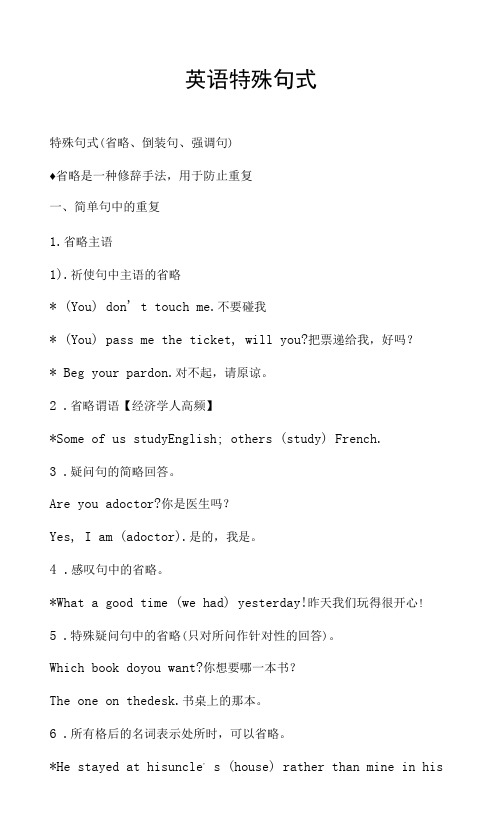
英语特殊句式特殊句式(省略、倒装句、强调句)♦省略是一种修辞手法,用于防止重复一、简单句中的重复1.省略主语1).祈使句中主语的省略*(You) don' t touch me.不要碰我*(You) pass me the ticket, will you?把票递给我,好吗?*Beg your pardon.对不起,请原谅。
2.省略谓语【经济学人高频】*Some of us studyEnglish; others (study) French.3.疑问句的简略回答。
Are you adoctor?你是医生吗?Yes, I am (adoctor).是的,我是。
4.感叹句中的省略。
*What a good time (we had) yesterday!昨天我们玩得很开心! 5.特殊疑问句中的省略(只对所问作针对性的回答)。
Which book doyou want?你想要哪一本书?The one on thedesk.书桌上的那本。
6.所有格后的名词表示处所时,可以省略。
*He stayed at hisuncle, s (house) rather than mine in his*It is a fact thathe has lost the game by one score.事实是他们以一分之差输掉了这一局。
(同位语从句。
fact “事实”就是that引导的从句“他以一分之差输掉了这一局二所以从句是对前面名词fact的解释,是同位语从句。
)*It is three yearssince we last met.自从我们上次相见已有三年To (since引导的状语从句)三、用“do/does/did+动词原形”进行强调这种强调句型只有一般现在时和一般过去时两种,只对肯定的谓语动词进行强调,没有疑问和否认形式。
Do在句中要重读,根据时态提炼出do 的各种形式,被提炼的动词变成动词原形。
英语特殊句式

A.which B.that
C.how D.when
解析:考查强调句型的用法。句意:影响我们生活的不是我们偶尔做什么,而是我们一贯做什么。强调部分是句子的主语,空格部分应是强调句型中的that,故选B项。
John talked with me for about an hour yesterday.Never had I heard him talk so much.
约翰昨天和我谈了约一个小时,在那之前,我从未听过他说那么多话。
By no means should you lose heart.你决不应该失去信心。
明天早点起床,如果不的话,你会错过早班车。
2.不定式省略,单独使用不定式符号to。
(1)用来代替动词不定式后被省略的动词,常在be afraid, be glad,forget,hope,intend,like,love,mean,prefer,refuse, seem,try,want,wish等的后边。
Dr.Smith,together with his wife and daughters,is going to visit Beijing this summer.(2009年高考陕西卷)
Dr.Smith将在今年夏天和妻子女儿们一起游览北京。
In my opinion,he rather than you,is to blame.
考点三 倒装句
1.完全倒装
(1)表示方式或方位的副词或介词短语,如here,there,now,then,up down,in,away,off,out,in the room,on the wall等,置于句首时,完全倒装。
Be quick!Here comes the bus.快点!公共汽车来了。
中考英语特殊句型总结归纳

中考英语特殊句型总结归纳英语是中考的重要科目之一,掌握一些特殊句型对提升英语水平和应对中考考试至关重要。
在本文中,我们将对中考英语常用的特殊句型进行总结和归纳,帮助同学们更好地掌握和应用这些句型。
1. 强调句型:强调句型用来强调一个信息,通常以"It is/was + 被强调部分 + that/who + 其他部分"的形式出现。
例句:It was the book that I borrowed from the library yesterday.翻译:就是那本我昨天从图书馆借的书。
2. It is/was...that...句型:这种句型用来强调句子的主语、宾语、表语等,可以强调的部分多种多样。
例句:It was at that moment that I realized I had made a big mistake.翻译:就是在那一刻,我意识到我犯了一个大错误。
3. 虚拟语气句型:虚拟语气用于表示与事实相反、与现在和将来事实相反、与过去事实相反等情况。
例句:If I were the president, I would make some changes to improve the economy.翻译:如果我是总统,我会做一些改变来改善经济。
4. 宾语从句:宾语从句用于作为主语、宾语、表语等句子成分,起连接两个句子的作用。
例句:I think that she is a great singer.翻译:我认为她是一个伟大的歌手。
5. 定语从句:定语从句用来修饰名词,对名词进行限定或者说明。
例句:She is the girl who won the first prize in the singing competition.翻译:她是那个在歌唱比赛中获得第一名的女孩。
6. 状语从句:状语从句用来修饰整个句子,起到状语的作用,可以表示时间、原因、条件等等。
例句:I will go to bed early if I finish my homework.翻译:如果我完成作业,我会早点睡觉。
高考英语必备特殊句式大全(附高考英语常用词汇)
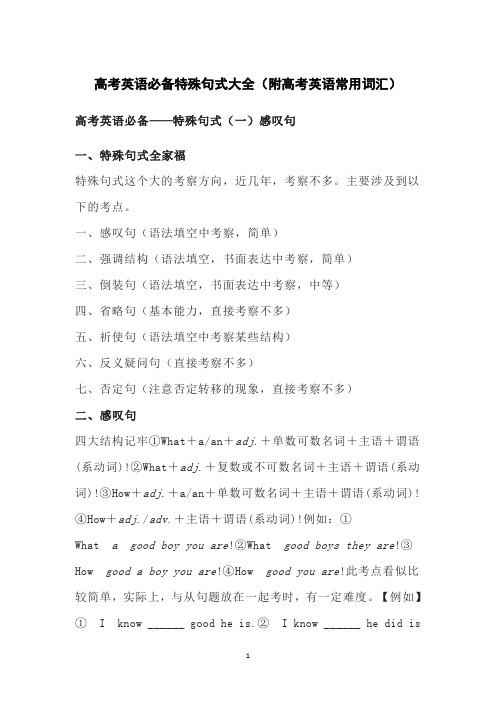
高考英语必备特殊句式大全(附高考英语常用词汇)高考英语必备——特殊句式(一)感叹句一、特殊句式全家福特殊句式这个大的考察方向,近几年,考察不多。
主要涉及到以下的考点。
一、感叹句(语法填空中考察,简单)二、强调结构(语法填空,书面表达中考察,简单)三、倒装句(语法填空,书面表达中考察,中等)四、省略句(基本能力,直接考察不多)五、祈使句(语法填空中考察某些结构)六、反义疑问句(直接考察不多)七、否定句(注意否定转移的现象,直接考察不多)二、感叹句四大结构记牢①What+a/an+adj.+单数可数名词+主语+谓语(系动词)!②What+adj.+复数或不可数名词+主语+谓语(系动词)!③How+adj.+a/an+单数可数名词+主语+谓语(系动词)!④How+adj./adv.+主语+谓语(系动词)!例如:①What a good boy you are!②What good boys they are!③How good a boy you are!④How good you are!此考点看似比较简单,实际上,与从句题放在一起考时,有一定难度。
【例如】①I know ______ good he is.②I know ______ he did isgood.在①中,答案为how,how good he is 是一个how 引导的感叹句;在②中,答案为what,what he did is good 是一个what引导的宾语从句问题来了,如何区分how,what引导的是感叹句还是从句呢?【答案】四个字,句!子!结!构!如宾语或者主语,或者表语;how引导的,其后是一个符合五大基本结构完整的句子。
【经典考察】(1)(2015年新课标卷Ⅱ)As natural architects, the Pueblo Indians figured out exactly ______(70) thick the adobe walls needed to be to make the cycle work on most days.【答案】how;how thick the adobe needed to be符合④How+adj./adv.+主语+谓语(系动词)!结构,故填how;(2)(2021年河南省天一联考)I recently spent a day in Hangzhou to see ______(65) easy it was to go cashless, and I found it somewhat ahead of other cities , including Beijing. I rode buses and subways, which all accept Alipay.【答案】how;how easy it is符合④How+adj./adv.+主语+谓语(系动词)! 结构,故填how;此外,初中的恶人搭配要记牢!how long;how soon;how far;how often;how many;how much【例】how long did he stay here?他在这里呆了多久How long is the river?这条河有多长?How often does he come here?他多久来这里一次?How soon will he be back?他多久之后会回来?How far is it from here to there?从这里到那里有多远。
英语特殊句式语法

英语特殊句式语法英语语法中存在一些特殊的句式结构,它们具有独特的语法规则和用法。
在本文中,我们将介绍一些常见的英语特殊句式,并通过示例来解释它们的用法。
一、倒装句倒装句是英语中常见的特殊句式之一,它采取了主语和谓语动词的位置颠倒。
倒装句的用法多种多样,下面是一些常见的情况:1. 完全倒装:当句子以表示地点状态的副词(如here, there, now, then等)开头时,需要完全倒装。
例如:Here comes the bus.There goes my hat.2. 部分倒装:在某些特定的条件下,主语和谓语动词的位置需要部分颠倒。
a. 在用于表示否定的副词或短语(如never, seldom, hardly, not until 等)开头的句子中,需要将助动词或情态动词与主语颠倒。
例如:Never have I seen such a beautiful sunset.Not until she left did I realize how much I loved her.b. 在以表示条件的状语从句(如if, unless, whether等)开头的句子中,需将助动词和主语颠倒。
例如:If only I had more time, I would travel around the world.Whether it rains or not, we will go camping.二、虚拟语气虚拟语气是英语中常见的特殊句式之一,用于表示与事实相反、假设或愿望等情况。
以下是虚拟语气的几种常见形式:1. 虚拟条件句:用于表示与事实相反的假设情况,包括类型1、类型2和类型3三种类型。
a. 类型1:表示真实可能发生的假设例如:If she studies hard, she will pass the exam.b. 类型2:表示与事实相反,但在理论上有可能实现的假设例如:If I were you, I would quit that job.c. 类型3:表示与过去事实相反的假设例如:If I had studied harder, I would have passed the exam.2. 虚拟表达愿望例如:I wish I could play the piano like a professional.3. 虚拟表达建议、命令等例如:The teacher suggested that they should review the material again.三、强调句强调句是一种特殊的句式,它通过强调句子中的某个成分来表达特殊的意义。
高中英语高考特殊句式知识点汇总(共五大类)

高考英语特殊句式汇总一、强调句型句型结构形式:It is/was…that/who…be的时态:that/who前面be的时态一般是一般现在时,当它后面的句子为过去时时,才用过去时。
判断方法:将(It is/was)...(that/who)…括号中的词同时去掉,看剩下的部分是否仍然成立。
若成立,则是强调句型;若不成立,则为状语从句、定语从句或主语从句。
They met the manager in the coffee shop the other day.*It was they that / who met the manager in the coffee shop the other day.*Was it they that / who met the manager in the coffee shop the other day?*Who was it that met the manager in the coffee shop the other day?*I wonder who it was that met the manager in the coffee shop the other day.*Can it be in the coffee shop where they once had a cup that they met the manager.* --- Who is making such noise downstairs?--- It is the children.二、祈使句祈使句的主语是you,但一般被省略;当前面有呼语时,一般得补出主语;否定式一般是在前面加Don’t,或是Never。
**在“祈使句,+ and/or/and then+句子”句型中,当祈使句中含有比较级时,可将祈使句中的谓语部分省略,只留下“比较级或比较级与名词,+and/or/and then+句子”。
英语特殊句式
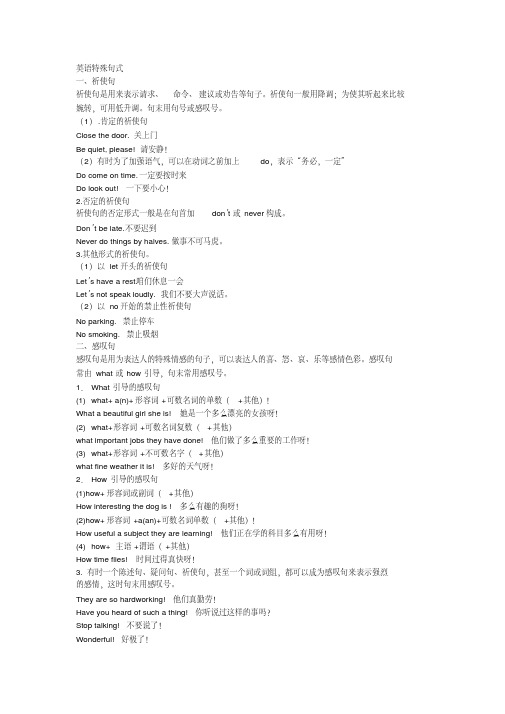
英语特殊句式一、祈使句祈使句是用来表示请求、命令、建议或劝告等句子。
祈使句一般用降调;为使其听起来比较婉转,可用低升调。
句末用句号或感叹号。
(1).肯定的祈使句Close the door. 关上门Be quiet, please! 请安静!(2)有时为了加强语气,可以在动词之前加上do,表示“务必,一定”Do come on time.一定要按时来Do look out! 一下要小心!2.否定的祈使句祈使句的否定形式一般是在句首加don’t或never构成。
Don’t be late.不要迟到Never do things by halves.做事不可马虎。
3.其他形式的祈使句。
(1)以let开头的祈使句Let’s have a rest.咱们休息一会Let’s not speak loudly. 我们不要大声说话。
(2)以no开始的禁止性祈使句No parking. 禁止停车No smoking. 禁止吸烟二、感叹句感叹句是用为表达人的特殊情感的句子,可以表达人的喜、怒、哀、乐等感情色彩。
感叹句常由what或how引导,句末常用感叹号。
1.What引导的感叹句(1)what+ a(n)+形容词+可数名词的单数(+其他)!What a beautiful girl she is! 她是一个多么漂亮的女孩呀!(2)what+形容词+可数名词复数(+其他)what important jobs they have done! 他们做了多么重要的工作呀!(3)what+形容词+不可数名字(+其他)what fine weather it is! 多好的天气呀!2.How引导的感叹句(1)how+形容词或副词(+其他)How interesting the dog is ! 多么有趣的狗呀!(2)how+形容词+a(an)+可数名词单数(+其他)!How useful a subject they are learning! 他们正在学的科目多么有用呀!(4)how+ 主语+谓语(+其他)How time flies! 时间过得真快呀!3. 有时一个陈述句、疑问句、祈使句,甚至一个词或词组,都可以成为感叹句来表示强烈的感情,这时句末用感叹号。
特殊句式知识点总结

特殊句式知识点总结在英语写作中,句式的多样性是提高文章质量和表达效果的关键因素之一。
使用特殊句式可以丰富你的写作风格,增加语言的表现力。
本文将针对常见的特殊句式进行总结和讲解,帮助读者掌握不同的句式结构和用法,从而提高英语写作的水平。
一、倒装句1.完全倒装句主语和谓语动词的位置颠倒,常见于以下情况:- Here comes the bus.- Little did I know that she was watching.2. 部分倒装句只有助动词或情态动词与主语的位置颠倒,常见于以下情况:- Never have I seen such a beautiful sunset.- Not only does she play the piano well, but she also sings beautifully.3. 否定副词位于句首时的倒装在否定副词开头的句子中,主语和谓语动词颠倒,常见于以下情况:- Seldom have I seen him so angry.- Barely had I arrived when the phone started ringing.倒装句的使用可以增加句子的变化和灵活性,使句子更加生动、抓人,但需要注意的是,倒装句不能随意使用,要根据句子的语境和表达的意思来决定是否使用倒装句。
二、强调句强调句是通过强调句子的一部分来突出该部分的重要性,使信息更加突出。
英语中的强调句有两种形式:部分强调和完全强调。
1. 部分强调部分强调是通过在句中加入强调词来使该部分的信息得到突出:- It was John who broke the vase.- It's this book that I want to read.2. 完全强调完全强调是通过借助助动词do或情态动词will加上动词原形来实现强调:- It was he who broke the vase.- It is this book that I will read.强调句的使用可以使句子更加生动、突出重点,但使用时要注意强调的对象,避免造成句子表达的混淆或误解。
英语八大特殊句式

英语八大特殊句式英语八大特殊句式一、主句+not…until…句型not…until…句型是一个倒装句,意思是“直到……才……”,not是部分否定,表示强调。
例句:I didn't go home until midnight.直到半夜我才回家。
二、It+be+形容词+that…句型此句型是强调句型,能形象准确表达出句子的意思,使句子语气更加强烈。
例句:It was amazing that he finished the work in such a short time.令人惊讶的是他竟然用如此短的时间就完成了这项工作。
三、not…until+从句句型not…until+从句句型表示内容得以实现的时间,或是强调情况发生的先后,通常译为“直到……才……”。
例句:I didn't know the news until he told me.直到他告诉我我才知道这个消息。
四、No…without+名词/代词句型No…without…句型表示肯定的含义,意思是“没有……就没有……”,常用在客观事实上。
例句:No success without hard work.没有努力就没有成功。
五、little+比较级/最高级+than句型此句型在主句中有肯定含义,常用在客观事实上,表示“……比……稍微……”。
例句:I'm a little younger than he is.我比他稍微年轻一点。
六、It+be+形容词+of+sb.+to do sth.句型此句型是结构严谨、表达精准的句型,将句子的客观内容与主观评价紧密连接在一起。
例句:It was very kind of you to help me.你帮助我真的很好。
七、it+be+宾语+that从句句型此句型可以表达出主句的肯定和客观,把主句和从句有机地结合在一起,而从句又可以表达句子的主观意见。
例句:It is important that we protect the environment.我们保护环境很重要。
